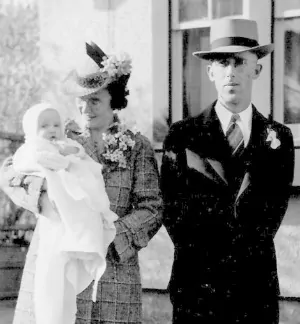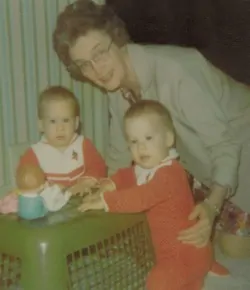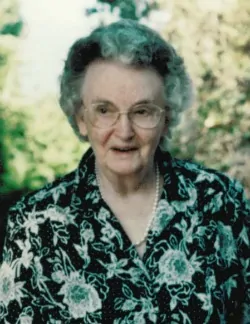This post may contain affiliate links. Read my disclosure policy here.

Born in 1906, she was a true product of her time — a hard working mother and wife who never complained and lived to serve.
Her husband suffered terribly from a sad and sickening case of alcoholism that paired with his chain smoking eventually led to his early death from throat cancer.
He died when he was only 58 and she was 60. Nana went on to live 33 more years as a single, retired woman.
Can you imagine living 33 years as a single, retired woman? How could she afford it?
The answer is… she couldn’t.
I didn’t know much about my Nana’s financial story until last night when I started talking to my mom about this campaign we’re running with Genworth Financial.
I called up my mom and said, “Mom, I’m writing a post about Long Term Care and I don’t know anything about it. Do you have Long Term Care? Did Nana? How long did she live without any income? How did she afford to live? Who paid for her nursing home?”
I was full of questions. I’d never thought of the cost of Nana living so long and suddenly I wanted to know the whole story.
My mom and I talked for a couple hours and she told me stories I’d never heard before about her childhood, her parents’ marriage, her father’s death and her mother’s financial struggles.
Nana worked as a full time stay-at-home mother when her two daughters were little, but then returned to work as a bookkeeper when her daughters were in high school and the family needed additional income.

My mom said that you needed an appointment to talk to her because she was always out volunteering somewhere.
As so many women do, Nana looked after everyone else and even used her savings to help her grown daughters and her grandchildren throughout the years.
When she was around 85 years old, Alzheimer’s had taken its evil grip, and she wasn’t safe living alone.
She was moved into a nursing home.
She lived there until she was 93 years old. But by the end she didn’t know who she was or where she was and she didn’t have enough money to pay to be there.

These days we’re being warned that our governments likely won’t have enough money to bail us out at the end.
That thought scares me.
Could I afford to live 33 years as a single, retired woman? What if there’s no government assistance to help me if I live to 93 and run out of money?
It’s scary stuff… but we need to think about it. As individuals, communities and nations… getting old is expensive business.
Who is going to pay for it?
Disclosure: This post is part of a compensated campaign with Genworth Financial. Together we hope to educate and empower women to take an active role in planning their families’ financial futures.
Written by Susan Carraretto, co-founder of 5 Minutes for Mom.
Wanna chat? Find me at: @5minutesformom, @susancarraretto and Facebook.com/5minutesformom.









maggie says
My grandma Winnie is 99 and has dementia. My mom and aunt split time living with her and the grandkids have a rotating schedule so she’s not left alone. We have found two different government programs to pay for nurses to visits and to pay one of my cousins who comes three days a week. She had lots of kids and grandkids and we are lucky that we are able to keep her home, but I know I don’t want my kids to do it for me.
Auriette says
I’ve never really thought about how my great-grandmothers lived for so long after their husbands died. My grandmothers both worked and received pensions. My mom’s parents also invested a lot in property, then as they got older, they would sell a piece at a time to replenish their bank accounts. They sacrificed a lot to be able to buy and maintain those properties, but I think as a percentage of income, that’s a lot more expensive to do now than it was then — primarily because of insurance and property tax increases. I’m fortunate in that my mother, who’s in her 70s, has her health care taken care of because of my dad’s military career, but I do worry about how I will take care of her as she gets older and what will happen to me and my husband when we get to that point.
Thanks for a great post!
liza says
my great grama lived to be 96 and my great grampa had died the year i was born… so she was without him for like 19 years. i wonder how she did it too.
Lolli says
You know what’s scary to me? THe fact that my in-laws are nearing the age of needing assistance. I don’t look forward to those years, both from the child’s perspective and later as the aging parent. It seems so far away, but everything happens so much faster than you’d ever imagine!
Susan says
Yes, everything does happen so much faster that you expect. It’s hard to believe that I’m nearing 40 and that my mom is already 70!
Sarita Edgerton says
My kids will have to take care of me just like I will do for my parents and my parents in law
Susan says
Yes, it usually does fall to the adult children to look after the aging parents and so it’s important for us to plan for that in our our financial planning.
Jennifer says
We just buried my husband’s grandfather last week — on his 92nd birthday! My 91 year old grandmother is still living at home (though I’m not sure she should be), and my husband has another grandmother in her late 80’s living at home doing well.
It’s definitely something to think about, because it’s expensive, and obviously longevity runs on both of our sides as well.
Susan says
Wow…. that is some longevity running in those genes! How remarkable that your 91 yr old grandmother is still at home.
What a blessing that your children get to have so many grandparents.